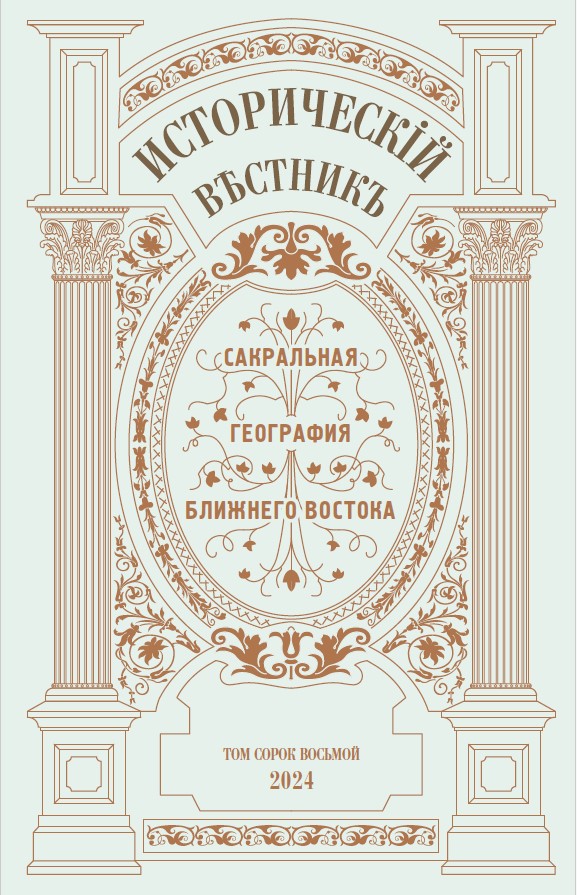
Кузенков П.В. Империя-вселенная и ее ареал. О приложении концепта государства-цивилизации к истории Византии
DOI: 10.35549/HR.2024.2024.48.001Кузенков П.В. Империя-вселенная и ее ареал. О приложении концепта государства-цивилизации к истории Византии// Исторический вестник. 2024. Т. XLVIII. С. 38–61.
Аннотация
В современной науке все более широко и плодотворно разрабатывается концепт «государства-цивилизации», который в последнее время активно используется, в частности, в официальных документах. Именно в этом ракурсе следует, по нашему убеждению, вести анализ феномена Византийской империи. Это, в свою очередь, ставит ряд нетривиальных исследовательских задач, актуальных не только для исторической науки, но и для изучения современных цивилизационных процессов. Одной из таких задач является реконструкция политико-географических представлений, в рамках которых происходило становление и развитие военно-административных и церковных институций средневековой восточнохристианской цивилизации — «византийского мира». В тесной взаимосвязи с этой задачей находится и проблема выявления динамики соотношений политического, церковного и культурного планов в исторической географии Византии.
Ключевые слова: Византийская империя, государство-цивилизация, ойкумена, православное миссионерство, Крым, Готская митрополия.
Кузенков Павел Владимирович — кандидат исторических наук, доцент кафедры «Социально-философские и политические науки», старший научный сотрудник Лаборатории Историко-археологической лабораториии по комплексному исследованию византийского Причерноморья, Институт общественных наук и международных отношений Севастопольского государственного университета.
***
Kuzenkov P.V. The Empire-Universe and Its area. On the Application of the Concept of State-Civilization to the History of Byzantium // Historical Reporter. 2024. Vol. 48. P. 38–61.
Abstract
In modern science, the concept of «state-civilization» is being increasingly and fruitfully developed, which has recently been actively used, in particular, in official documents. It is from this perspective that, in our opinion, one should analyze the phenomenon of the Byzantine Empire. This, in turn, poses a number of nontrivial research problems that are relevant not only for historical science, but also for the study of modern civilizational processes. One of these tasks is the reconstruction of political and geographical ideas within which the formation and development of military-administrative and church institutions of the medieval Eastern Christian civilization — the «Byzantine world» — took place. Closely related to this task is the problem of identifying the dynamics of the relationships between the political, church and cultural plans in the historical geography of Byzantium.
Key Words: Byzantine Empire, State-Civilization, Ecumene, Orthodox missionary, Crimea, Gothic Diocese.
Pavel V. Kuzenkov — C.Sc. (History), associate professor at the Moscow State University Historical Department, director of «The Grand Mediterranean» REC at the Sevastopol State University.
***
References
- Analecta Byzantino-Russica / Ed. W. Regel. New York: Burt Franklin, 1963 (repr.).
- Chichurov I.S. Byzantine historical works: «Chronography» by Theophanes and «Breviary» by Nikephoros [Vizantiyskiye istoricheskiye sochineniya: «Khronografiya» Feofana i «Breviariy» Nikifora]. Moscow: Nauka, 1980.
- Conciliorum oecumenicorum generaliumque decreta. T. I: The Oecumenical Councils from Nicaea I to Nicaea II (325–787) / Ed. G. Alberigo, A.M. Ritter, L. Abramowski, E. Mühlenberg, P. Conte, H.-G. Thümmel, G. Nedungatt, S. Agrestini, E. Lamberz, J.B. Uphus. Turnhout: Brepols, 2006.
- Concilium Universale Nicaenum Secundum / Ed. E. Lamberz (Acta Conciliorum Oecumenicorum, series 2; vol. 3). Berlin; New York: de Gruyter, 2008–2012. Pars 1–2.
- Corpus Iuris Civilis. Vol. III: Novellae / Ed. R.Schoell et G.Kroll. Berlin: Wedimann, 1954 (6 ed.).
- Eusebii Chronicorum libri duo / Ed. Ph. Schoene. Vol. I. Berlin: Weidmann, 1877.
- Ferluga J. I confini dell’impero romano d’oriente: nozione e realtà // Popoli e spazio romano fra diritto e profezia. P.378.
- GrunebaumG.E. von. Islam and Medieval Hellenism. London: Variorum Reprints, 1976. Art. XIX. S.47–50.
- Ioannes Cantacuzenus. Historiae / Ed. L.Schopen. T.III. Bonn: Weber, 1832.
- Klaudios Ptolemaios. Handbuch der Geographie / Hrsg. G.Grasshoff, A.Stückelberger. Basel: Schwabe, 2006.
- Klein E. A Comprehensive Etymological Dictionary of the Hebrew Language for Readers of English. Jerusalem & Tel Aviv: Carta, 1987.
- Lanciotti F. Lo spazio romano nella terminologia giuridica delle fontigiustinianee in lingua latina // Popoli e spazio romano. P.351– 363.
- Liddell H.G., Scott R., Jones H.S. A Greek-English Lexicon. Oxford: Clarendon Press, 1996 (9 ed.).
- Michael Psellos. Chronography. Brief history / Transl. Ya.N. Lyubarsky and others [Mikhail Psell. Khronografiya. Kratkaya istoriya]. St. Petersburg: Aletheya, 2003.
- Nazarenko A.V. German Latin-language sources [Nemetskiye latinoyazychnyye istochniki]. Moscow: Nauka, 1993.
- Notitiae episcopatuum Ecclesiae Constantinopolitanae / Ed. J.Darrouzès. Paris: Institut français d’études byzantines, 1981.
- Obolensky D.D. Byzantine Commonwealth of Nations. Six Byzantine portraits [Obolenskiy D.D. Vizantiyskoye sodruzhestvo natsiy. Shest’ vizantiyskikh portretov]. Moscow: VRS, 2012.
- Patrologia Latina / Ed. J.-P.Migne. T. 129. Paris: Migne, 1879.
- Polyakova S.V., Felenkovskaya I.V. Anonymous geographical treatise «Complete description of the universe and peoples» [Anonimnyy geograficheskiy traktat «Polnoye opisaniye vselennoy i narodov»] // Vizantiiskii Vremennik. 1956. Vol. 8. P.277–304.
- Rosen V.R. Emperor Vasily the Bulgarian Slayer. Extracts from the chronicle of Yahya of Antioch [Imperator Vasiliy Bolgaroboytsa. Izvlecheniya iz letopisi Yakh’’i Antiokhiyskogo]. St. Petersburg, 1883.
- Rules of the Holy Apostles and Holy Fathers with interpretations [Pravila svyatykh Apostol i svyatykh Otets s tolkovaniyami]. Sibirskaya blagozvonnitsa. Moscow, 2000.
- Shifman I.Sh. Caesar Augustus [Tsezar’ Avgust]. Leningrad: Nauka, 1990.
- Theophanis Chronographia / Ed. C. de Boor. Leipzig: Teubner, 1883. (Bibliotheca scriptorum Graecorum et Romanorum Teubneriana).
- Vasmer M. Etymological dictionary of the Russian language [Etimologicheskiy slovar’ russkogo yazyka]. Moscow: Nauka, 1986.
- Virgil / Ed. and transl. by H. Rushton Fairclough. Vol. I. London: Heinemann; New York: Putnam, 1916.
- Virgil. Bucolics. Georgics. Aeneid [Vergiliy. Bukoliki. Georgiki. Eneida]. Moscow: Khudozhestvennaya literature, 1979.
- Zars’ Titles-book [Tsarskiy Titulyarnik]. Moscow: Drevlekhranilishtche, 2008.

